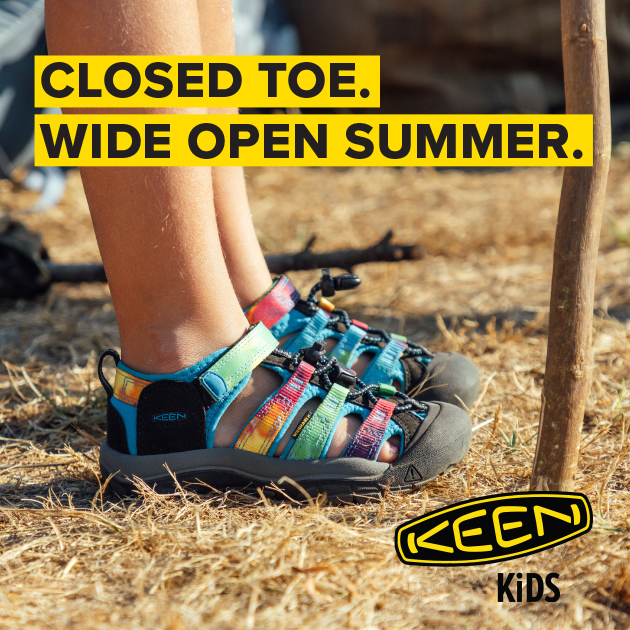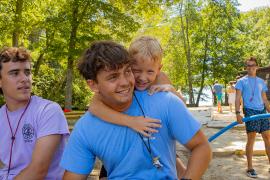In her best-selling book Lean In, Facebook COO Sheryl Sandberg challenged women in the workforce to fight a lack of self-confidence in order to forge fulfilling and rewarding personal and professional lives. Similarly, I would recommend that you, in your work as a camp counselor this summer, lean into the relationships with the young people in your care.
My first camp boss, Grant W. Koch, was known to advise his counselors to “take advantage of your opportunities.” Chief among those, of course, was making a positive difference in the lives of our campers.
This summer you have those very same opportunities.
Another orientation speaker who inspired me during my very first summer of work was Lonnie Carton, PhD, a Tufts University professor of child studies, radio show host, and author (Raise Your Kids Right). She implored us to remember that our primary responsibility is to help kids feel lovable and capable. Sounds right, right?
Developmental Relationships
For its part, the Search Institute, which partners with organizations to conduct and apply research that promotes positive youth development and advances equity, puts a primary emphasis on “developmental relationships,” about which they offer the following (Search Institute, 2022a):
Developmental relationships are the roots of young people’s success. They are essential for all young people, in every community. When young people experience these relationships in their families, schools, programs, and communities, they are more likely to be resilient in the face of challenges and grow up thriving.
- Through developmental relationships, young people . . .
- Discover who they are
- Cultivate the abilities needed for them to shape their own lives
- Learn how to engage with and contribute to the world around them
Summer camp is really good at promoting all three.
The Search Institute has also said that to truly thrive, young people need the support of at least three nonparent adults. Now you get to be one of them!
Transactional versus Relational Camping
Creating effective developmental relationships necessarily means moving beyond a transactional role of minding camp basics, such as making sure the kids get up on time, make it to meals (and eat), practice good personal hygiene, and write home occasionally. While those roles are fundamental to your job, transcending them by doing the hard work of actually establishing meaningful connections with the kids (and it can be hard work) is what will make the things you do this summer truly transformative.
Taking a page from sage parenting advice, we can best connect with our campers by doing the following things (Sandefer, 2022):
- Observe deeply and listen with authentic curiosity to their thoughts and opinions instead of assuming we know them. This helps protect our children from the tendency to project our own regrets and insecurities onto them.
- Ask questions and tell stories more often than giving lectures and directives. This communicates respect and inspires vulnerability.
- Keep in touch weekly with their goals . . . Then ask about when and if they get into their panic zones . . . What is most challenging? Where are they finding pleasure and ease in their work each day? What scares them? Where do they need support? Where can they find that support? This sharing helps us remember how hard learning is. Check back in at the end of the week to see how things went. This . . . builds empathy for their experience.
- Sit with them quietly when failure happens — and encourage them to get up again and get back in the game. This . . . proves we believe in them and trust them.
Remember, being the “rah-rah” staff member is great, but what really counts are the relationships you will forge with your campers. Without those, it’s all just a lot of noise.
The Power of Presence
Many years ago, I was asked by a camp mom if I could take a Boy Scout course to sign off on her son’s merit badge awards while he was at camp. It was the beginning of orientation week so I demurred. Through persistence and pulling at heart strings (“I know you’ll do it for John”), she wore me down. I took the course, passed the exam, and am now a certified merit badge counselor in archery and swimming!
As a thank you, John’s mom sent me a copy of the book This I Believe, inspired by the NPR radio program of the same name. In it, I found many inspiring stories. One, in particular, reinforced my beliefs about relational camping. It was written by psychologist Debbie Hall and is called “This I Believe: The Power of Presence.” Here is an excerpt (Hall, 2005).
Presence is a noun, not a verb; it is a state of being, not doing. States of being are not highly valued in a culture which places a high priority on doing. Yet, true presence or “being with” another person carries with it a silent power — to bear witness to a passage, to help carry an emotional burden or to begin a healing process. In it, there is an intimate connection with another that is perhaps too seldom felt in a society that strives for ever-faster “connectivity” . . . .
With therapy clients, I am still pulled by the need to do more than be, yet repeatedly struck by the healing power of connection created by being fully there in the quiet understanding of another. In it, none of us are truly alone.
The power of presence is not a one-way street, not only something we give to others. It always changes me, and always for the better.
It will change you for the better, too. I guarantee it.
Cameron’s Story
Advice from books and lectures can be helpful in preparing you for the incredibly important role you will play this summer. But, sometimes, hearing from someone who has “walked in your shoes” is especially poignant. Thus, I share the story of a former camper, Cameron Gray, who became a counselor, in his own words.
Through my summer as a first-year counselor, I was in for quite a treat. My co-counselor and I were in charge of eight 12-year-old boys for two weeks, which might sound like a horrible idea but actually turned out to be an eye-opening experience. These gentlemen came to camp not knowing each other (or me), and all I had was a paper with their pictures and names. Two weeks later, I formed a stronger bond with this group than even with my friends. Some campers were very independent and could get things done and be mature during activities. Other campers needed a little more support, help, and sternness from me. They were not only able to get me mad, but also make me laugh seconds later!
One day I cut open my foot, and then I was on crutches for a week. As you know, being on crutches at a summer camp sounds miserable, and it was. However, through this hardship and mishap, I was able to set an example for my campers. Even when my arms were killing me and I was incredibly tired, I realized that this was bigger than me, so I would be strong for them. The night after the accident happened, I gathered the campers in the cabin and gave them a talk about not taking anything for granted and that when life throws you a curveball, it is time to reassess, learn, and grow. After this, many of them began to cry and came and gave me a hug. At that moment I could really tell I had a huge impact on their lives.
Another time I knew I made a major impact on their lives was when parents came to pick up their campers at the end of the session. Many parents came up to me and said, “You must be Cameron! Jared told us so much about you in his letters. You are an incredible role model and he really loved you.”
That hit hard. That was it!
That Is It!
Cameron wishes you a summer filled with love, laughter, and friendship, leaning in to form fantastic relationships with your campers and helping them to grow into their best selves.
|
Discussion Questions
|
References
Hall, D. (2005). The power of presence. This I Believe. All Things Considered. thisibelieve.org/essay/6647/ (14 Feb. 2022).
Sandberg, S. (2013). Lean In: Women, Work and the Will to Lead. New York: Knopf.
Sandefer, L. (2022). 5 ways to support your child’s learning. Acton Academy. start.actonacademy.org/lauras-blog-5-ways-to-support-your-childs-learning/ (14 Feb. 2022).
Search Institute. (2022a). Developmental relationships. search-institute.org/developmental-relationships/ (14 Feb. 2022).
Search Institute. (2022b). Developmental assets framework. search-institute.org/our-research/development-assets/developmental-assets-framework/ (14 Feb. 2022).
Stephen Gray Wallace, MS Ed, is a doctoral candidate in The Institute for Ethical Leadership at St. Thomas University in Miami, Florida. He is also an associate research professor and president and director of the Center for Adolescent Research and Education (CARE). Stephen has broad experience as a camp director and school psychologist. He is a member of the professional development faculties at the American Academy of Family Physicians and American Camp Association and a parenting expert at kidsinthehouse.com, NBC News Learn, and WebMD. He is also an expert partner at the Risk Assistance Network & Exchange (RANE) and was national chairman and chief executive officer at SADD for 16 years. Stephen is an award-winning writer and author of the books Reality Gap and IMPACT. Additional information about Stephen’s work can be found at StephenGrayWallace.com.
(c) Summit Communications Management Corporation 2022. All Rights Reserved.




